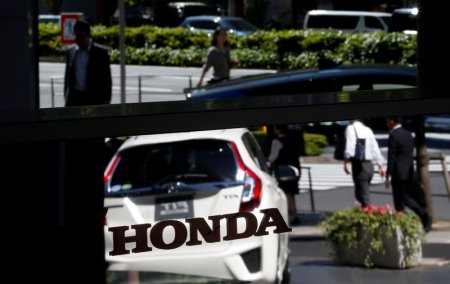-
Tips for becoming a good boxer - November 6, 2020
-
7 expert tips for making your hens night a memorable one - November 6, 2020
-
5 reasons to host your Christmas party on a cruise boat - November 6, 2020
-
What to do when you’re charged with a crime - November 6, 2020
-
Should you get one or multiple dogs? Here’s all you need to know - November 3, 2020
-
A Guide: How to Build Your Very Own Magic Mirror - February 14, 2019
-
Our Top Inspirational Baseball Stars - November 24, 2018
-
Five Tech Tools That Will Help You Turn Your Blog into a Business - November 24, 2018
-
How to Indulge on Vacation without Expanding Your Waist - November 9, 2018
-
5 Strategies for Businesses to Appeal to Today’s Increasingly Mobile-Crazed Customers - November 9, 2018
Honda reports quarterly loss on strong yen, air-bag recall
Honda Motor Co posted a quarterly loss on Friday, hit by massive recall costs for Takata air bags but forecast a rebound this year as it took dramatic steps to put the debacle behind it.
Advertisement
The company said it had set aside a total 436 billion yen for air bag-related costs in the last business year, almost quadruple the 120 billion yen in the previous year.
Honda, meanwhile, will recall 21 million more vehicles to replace Takata airbags, Executive Vice President Tetsuo Iwamura told reporters.
Some 50 million cars that use Takata airbags have been recalled globally after they were blamed for at least 11 deaths, mostly on cars made by Honda, the supplier’s biggest customer.
Honda is the only automaker among Japan’s top three to post a net profit drop for the year ended in March.
“Honda accounted for the worst of the Takata-related issue in the last financial year”, said a brokerage analyst who asked not be named because he covers Honda as part of a team.
Investigators increasingly suspect that the chemical used to inflate Takata airbags can be unstable, especially in hot and humid conditions, and cause the inflator canister to rupture.
U.S. authorities said earlier this month that Takata must file new defect reports covering 35-40 million additional inflators that will lead to recalls by automakers. The company attributed the decline to currency effects and higher expenses, including recall-related costs, which together more than offset boosts from an improved sales mix and cost reductions.
“The science clearly shows that these inflators become unsafe over time, faster when exposed to humidity and variations of temperature”, the US National Highway Traffic Safety Administration said last week.
The problem is that the inflators can deploy with too much force spraying metal shrapnel inside a vehicle.
Advertisement
Rival Toyota warned this week that its net profit for the current year to March 2017 will fall by about a third as a stronger yen and a slowdown in Chinese growth and other emerging markets dent its bottom line.





























